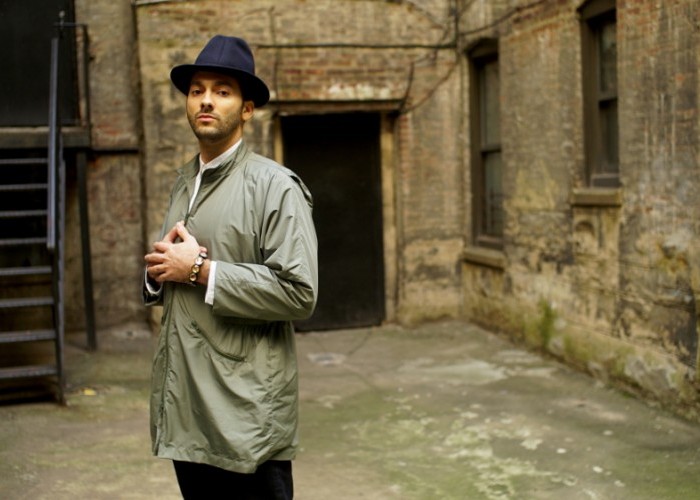Jan 13, 2026 2:09 PM
More Trump-Kennedy Center Cancellations
The fallout from the renaming of the John F. Kennedy Center for the Performing Arts to include President Donald…

It was a “one-off” from New York. Pianist David Virelles’ ensemble was in Kalamazoo, Michigan, performing at Bell’s Eccentric Cafe as part of the mostly classical 14th-biennial Irving S. Gilmore International Keyboard Festival. Playing two sold-out shows on May 10, Virelles was joined by bassist Rashaan Carter, drummer Marcus Gilmore and percussionist Roman Diaz.
What audience members would hear was, according to Virelles’ then-predictions, “a combination of the stuff that was recorded on my latest album [Gnosis on ECM], rearranged for this particular group.” At opposite ends of the stage, the pianist, 35, squared off with the drummer and percussionist, the bass rightly anchored at center stage. The pulse was consistently irregular—except when there was no pulse or groove. There were thick, dense chords, ruminative, unadorned melodies laid bare, yet resolute. For more than 90 minutes, otherworldly moments alternated with churning Latin strains of music.
The Cuban-born Virelles, who moved to New York in 2009, spoke with DownBeat the night before.
The following has been edited for length and clarity.
How would you describe your music?
I like to think of myself as an artist with a wide range of possibilities. My work is coming out of a lot of traditional stuff, because I make it a point to go back and research, and have connections with the past.
Here’s the thing: My music is a hundred percent traditional. In jazz, I was always drawn to a very particular lineage that you could trace back to Thelonious Monk, Bud Powell, Randy Weston. There’s Herbie Nichols, Andrew Hill, Muhal Richard Abrams, Alice Coltrane. There are certain rhythmic elements, certain elements in that culture that I see very much related to how people play music in Cuba, and how people relate to each other in Cuba.
A similar spirit?
To a point, because music is a result of how people are living their lives. So, obviously, how people live in Cuba is very different than here. But I think there’s a reason why Dizzy Gillespie hooked up with Chano Pozo, and Machito with Bird. There’s a certain kind of esthetic that’s shared amongst people in the African diaspora, a certain type of feeling that you get from the music; Dizzy and Bird were aware of that, they went for it, and they made the connection. Thanks to people like that, we’re doing what we’re doing today.
How many Cuban artists have studied with Henry Threadgill?
I’m the only pianist, but in the last few years, [reed player] Román Filiú also started working with Henry. Filiú and I have been working in a couple different bands of Henry’s. Henry’s a natural teacher. Even if he’s not sitting down and doing like a lesson, he can get very specific and very technical. But it’s a different approach.
You’ve had a few other teachers and influences.
In the early 2000s, I was studying with Barry Harris in Toronto, when he would come up. I was going to school, and I was working with Jane Bunnett, who was responsible for inviting me to Toronto. And there were brief encounters with Kenny Barron, Cedar Walton, Stanley Cowell and, especially, Steve Coleman.
In Cuba, as far as jazz and popular music, I was self-taught. I was going to music school for classical piano, and my parents are musicians. My aunt is a concert pianist, who graduated from The Moscow Conservatory in Russia.
Roman Diaz figures prominently in your life.
Roman grew up in Havana and comes from a background where the folkloric traditions are very strong. To me, he is like a modern-day Chano Pozo, bringing together the Cuban folkloric world and the New York improvisational world.
Along with Gnosis, under your own name, you’ve recorded Continuum (Pi), Mboko and the electric Antenna, the latter two for ECM. And you’ve collaborated with Chris Potter, Ravi Coltrane and Tomasz Stanko.
In those instances, I’m helping realize specific musical visions. I’m invited to be part of a conversation where sharp reflexes and instinct are key.
And the 14-piece Nosotros Ensemble of Gnosis?
It’s “our music.” We: The music that I’m making with the people who are close to me. DB

Belá Fleck during an interview with Fredrika Whitfield on CNN.
Jan 13, 2026 2:09 PM
The fallout from the renaming of the John F. Kennedy Center for the Performing Arts to include President Donald…

Peplowski first came to prominence in legacy swing bands, including the final iteration of the Benny Goodman Orchestra, before beginning a solo career in the late 1980s.
Feb 3, 2026 12:10 AM
Ken Peplowski, a clarinetist and tenor saxophonist who straddled the worlds of traditional and modern jazz, died Feb. 2…

The success of Oregon’s first album, 1971’s Music Of Another Present Era, allowed Towner to establish a solo career.
Jan 19, 2026 5:02 PM
Ralph Towner, a guitarist and composer who blended multiple genres, including jazz — and throughout them all remained…

Rico’s Anti-Microbial Instrument Swab
Jan 19, 2026 2:48 PM
With this year’s NAMM Show right around the corner, we can look forward to plenty of new and innovative instruments…

Richie Beirach was particularly renowned for his approach to chromatic harmony, which he used to improvise reharmonizations of originals and standards.
Jan 27, 2026 11:19 AM
Richie Beirach, a pianist and composer who channeled a knowledge of modern classical music into his jazz practice,…